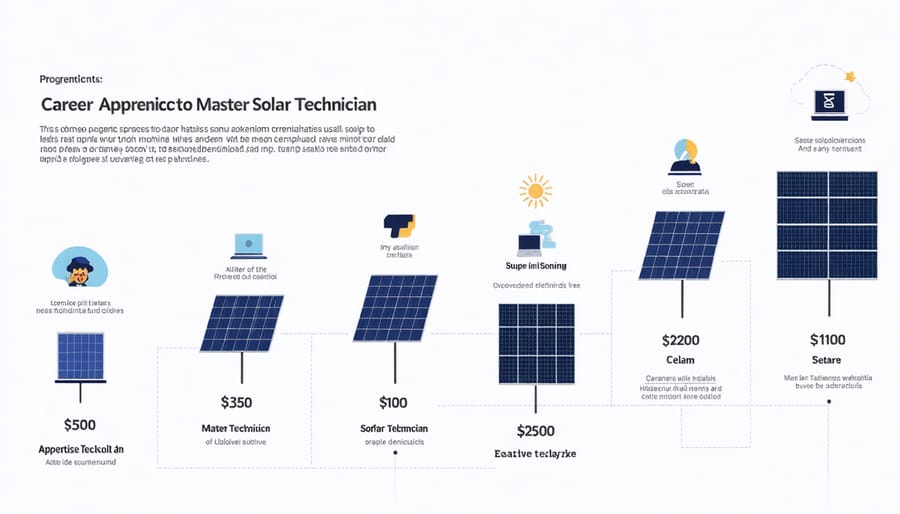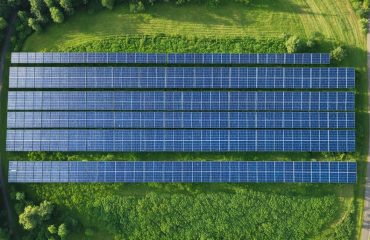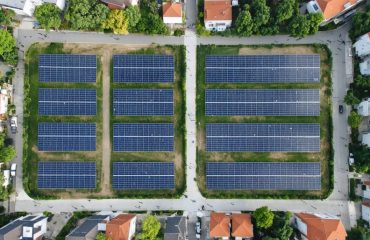Union solar jobs represent a transformative force in America’s energy landscape, combining the promise of sustainable energy with stable, well-paying careers. As the solar industry experiences unprecedented growth—expanding by over 40% annually—union positions are emerging as the gold standard for worker protection and professional development in renewable energy. These roles offer not just competitive wages averaging $30-40 per hour, but comprehensive benefits packages, apprenticeship programs, and clear career advancement pathways. From solar panel installation specialists to electrical system designers, union jobs are reshaping traditional blue-collar work into green-collar opportunities, creating a sustainable workforce that powers our clean energy future. With federal infrastructure investments and state-level renewable energy mandates driving demand, union solar jobs stand at the intersection of environmental stewardship and economic prosperity, offering workers the chance to build both a career and a more sustainable world.
The Rise of Union Solar Jobs

What Makes Solar Jobs Union-Friendly
Solar installation and maintenance work naturally aligns with union values and standards, making it an ideal fit for organized labor. The structured nature of solar projects requires skilled teams working together safely and efficiently, which mirrors traditional union work environments. Solar installations demand precise technical knowledge, consistent quality standards, and strict safety protocols – all hallmarks of union craftsmanship.
The renewable energy sector’s emphasis on proper training and certification matches union principles of ongoing education and skills development. Solar workers need regular updates on new technologies and installation methods, similar to how unions have historically provided apprenticeships and continuous learning opportunities.
Additionally, solar projects often involve public works and large commercial installations, which typically require prevailing wages and benefits – standards that unions have long fought to establish and maintain. The industry’s focus on quality workmanship, fair wages, and worker safety creates natural opportunities for union organization and representation.
The growing demand for solar energy also ensures stable, long-term employment prospects, allowing unions to negotiate better conditions and benefits for their members while supporting sustainable energy goals.
Benefits of Union Solar Employment
Union solar jobs offer significantly higher wages compared to non-union positions, with skilled solar installers typically earning 20-30% more than their non-union counterparts. These positions come with comprehensive health insurance packages, retirement benefits, and paid time off – essential components of long-term financial security.
Career advancement opportunities are abundant in union solar work. Workers gain access to extensive training programs and apprenticeships, allowing them to continually upgrade their skills and move into specialized roles or leadership positions. Many unions partner with solar companies to provide certification programs and ongoing education at little to no cost to members.
The benefits extend beyond just compensation. Union solar workers enjoy safer working conditions, regular schedules, and strong workplace protections. They also receive specialized safety training and proper equipment, crucial for working at heights and with electrical systems. Additionally, union representation ensures workers have a voice in workplace decisions and fair treatment.
Most importantly, union solar jobs provide stability in a rapidly growing industry, combining the security of union protection with the innovation of renewable energy.
Local Economic Impact
Job Creation and Training Programs
Union-backed solar education and training programs are creating pathways to well-paying careers across America. Local unions partner with community colleges and technical schools to provide comprehensive training in solar installation, maintenance, and system design. These programs typically run for 3-6 months and combine classroom learning with hands-on experience.
Participants learn essential skills like electrical theory, safety protocols, and renewable energy fundamentals while earning industry-recognized certifications. Many programs offer apprenticeships that lead to full-time employment, with starting wages typically ranging from $18-25 per hour plus benefits.
The solar industry’s rapid growth has created a surge in demand for skilled workers. Union training centers are responding by expanding their facilities and course offerings. Many programs specifically target veterans, displaced workers, and underserved communities, providing tuition assistance and job placement services.
Local initiatives often collaborate with manufacturers and contractors to ensure training aligns with industry needs. This partnership approach has resulted in impressive job placement rates, with some programs reporting 85% or higher success rates for graduates entering the solar workforce.
These training programs are particularly valuable because they prepare workers for long-term careers, not just immediate jobs. As solar technology evolves, union members receive ongoing education to stay current with industry advances, ensuring sustainable employment in this growing field.

Community Economic Benefits
Union solar jobs create a powerful ripple effect throughout local economies, extending far beyond direct employment in the industry. For every solar installation project, additional jobs are generated in supporting sectors like manufacturing, transportation, and construction supply. Local businesses, from hardware stores to restaurants, experience increased revenue as solar workers spend their wages within the community.
Studies show that union solar projects typically generate 1.5 to 2 additional jobs for every direct solar position created. These indirect jobs support clean energy accessibility while strengthening local economic resilience. When union workers earn family-sustaining wages, they invest more in their neighborhoods, supporting small businesses and contributing to the local tax base.
The economic benefits extend to property values as well. Communities with strong solar industry presence often see increased home values and attracted new businesses. Local governments benefit from expanded tax revenues, which can fund essential services and infrastructure improvements. Additionally, money saved on energy costs by homes and businesses with solar installations tends to be reinvested locally, creating a sustainable cycle of economic growth.
Union solar projects also frequently partner with local vocational schools and community colleges, creating training opportunities that prepare residents for long-term careers in the renewable energy sector. This investment in workforce development ensures that economic benefits remain rooted in the community for generations to come.
Future Growth and Opportunities
Industry Expansion Projections
The solar industry is experiencing unprecedented growth, with projections indicating a remarkable expansion over the next decade. According to the U.S. Bureau of Labor Statistics, solar installer jobs are expected to grow by 52% through 2030, making it one of the fastest-growing occupations in America. This surge in demand is creating thousands of well-paying union positions across the country.
Industry analysts forecast that the solar sector will need to add over 900,000 workers by 2035 to meet the nation’s clean energy goals. Union jobs are particularly well-positioned to benefit from this expansion, as large-scale solar projects and community solar initiatives often require skilled union labor for installation and maintenance.
States with strong renewable energy policies are leading the way, with California, Texas, and New York expected to create the highest number of new solar jobs. The expansion isn’t limited to installation work – manufacturing, sales, and project development roles are also seeing significant growth. Union workers in these positions typically earn 10-15% more than their non-union counterparts and receive comprehensive benefits packages.
This growth is driven by falling solar technology costs, increasing environmental awareness, and supportive federal policies, including tax incentives and clean energy initiatives. As more homeowners and businesses adopt solar energy, the demand for skilled union workers continues to rise, creating stable, long-term career opportunities in the renewable energy sector.

Career Paths and Skills Development
The union solar industry offers diverse career paths with opportunities for growth and advancement. Entry-level positions like solar installers and electrical apprentices provide a solid foundation, with clear progression routes to lead installer, project manager, and system designer roles. Many workers start with basic construction or electrical experience and develop specialized solar skills through union-sponsored training programs.
Key skills valued in union solar jobs include electrical knowledge, physical stamina, attention to safety protocols, and basic mathematics. Technical training typically covers solar panel installation, electrical systems, roof assessment, and equipment maintenance. Unions often provide comprehensive apprenticeship programs that combine classroom learning with hands-on experience, ensuring members develop both theoretical knowledge and practical skills.
Career advancement often involves obtaining industry certifications such as the North American Board of Certified Energy Practitioners (NABCEP) credentials. Union workers also benefit from ongoing professional development opportunities, including specialized workshops in emerging technologies like battery storage and smart grid integration.
As the solar industry continues to grow, new specializations are emerging in areas such as quality control, system optimization, and operations maintenance. Union members can also pursue leadership roles in project supervision, training, or union administration. The combination of structured training programs, clear advancement pathways, and continuous learning opportunities makes union solar careers particularly attractive for those seeking long-term professional growth in renewable energy.
The growth of union solar jobs represents a bright spot in America’s evolving energy landscape, offering workers and communities a path toward a sustainable future. These positions not only provide family-supporting wages and comprehensive benefits but also contribute significantly to local economic development and the nation’s clean energy goals.
As the solar industry continues to expand, the demand for skilled union workers is expected to surge, with projections suggesting a doubling of solar jobs over the next decade. This growth is driven by increasing homeowner adoption, supportive policies, and declining installation costs. Union solar jobs are particularly well-positioned to meet this demand while maintaining high quality standards and worker protections.
The combination of strong labor practices and renewable energy development demonstrates that environmental sustainability and worker prosperity can go hand in hand. With continued investment in training programs, apprenticeships, and infrastructure projects, union solar jobs will remain a crucial component of America’s clean energy transition, providing stable careers while helping communities achieve their climate goals.
Looking ahead, these positions will continue to offer opportunities for workers to participate in building a more sustainable future while enjoying the security and benefits of union membership.









